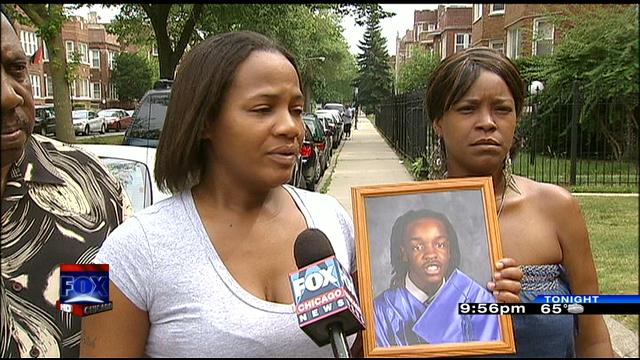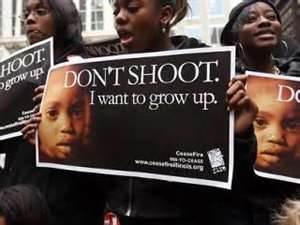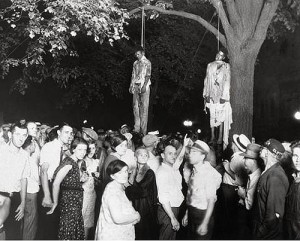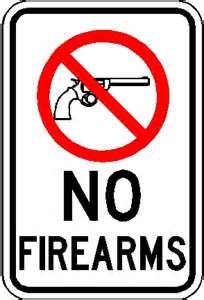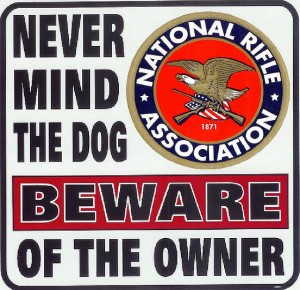Supporting gun-control is racist
In America today, especially in America’s media, the worst thing you can call someone is “racist.” In our Obama-era people who oppose Obama are racist; people who support the Constitution are racist; people who use the word “Chicago” are racist; people who comment about the president’s lean physique (unless they’re drooling female reporters) are racist; and –here’s the kicker — people who oppose gun control are racist.
Why is opposing gun control racist? Because blacks are proportionately much more likely to find themselves at the wrong end of the gun in America than are whites. Even though blacks comprise only 13% of the population, in 2007 alone black death rates due to guns were more than twice white death rates. Put another way:
Young black males die from gun violence at a rate 2.5 times higher than Latino males, and eight times higher than white males. Gun injuries are suffered by black teens at a rate ten times higher than white teens.
Guns are an extraordinary scourge within the black community — a fact that also explains why America’s gun homicides are (a) high and (b) unequally spread geographically. A vast proportion of gun crime is inner city crime.
Given these appalling statistics — black men being mowed down by a plague of bullets — liberals say that anyone who doesn’t want to remove guns from the street is a fortiori a racist. The logic is simple: guns kill black people; Republicans, who are disproportionately white, resist any form of gun control; therefore Republicans hate black people.
The problem with the above liberal analysis is that it’s an entirely false syllogism. Here’s the truth: what’s killing black men is gun control. Black men live in dangerous areas and we have disarmed them.
Don’t believe me? The numbers back me up.
Chicago is now, and has long been, a deadly city for blacks. The sweetness and light of non-stop Democrat rule has done nothing to make it safer. At a certain point in this deadly trajectory, Chicago Progressives made an announcement: a lot of the people who died in Chicago died from gunshots. Thinking simplistically, they decided that the next step was to get rid of the guns. Chicago therefore enacted some of the most repressive gun-control in the nation. Had the Democrat logic been correct, the “homicide by gun” rate in Chicago should have plummeted in the wake of this legislation. As John Lott explains, the opposite was true:
Since late 1982, Chicago has banned the private ownership of handguns. Over the next 19 years, there were only three years where the murder rate was as low as when the ban started.
As shown in the forthcoming third edition of my book “More Guns, Less Crime,” before the ban, Chicago’s murder rate was falling relative to the nine other largest cities, the 50 largest cities, the five counties that border Cook county, as well as the U.S. as a whole. After the ban, Chicago’s murder rate rose relative to all these other places.
In other words, banning guns killed black men.
Chicago is not anomalous. Washington, D.C., showed precisely the same pattern. Here’s John Lott again, looking at the way the numbers are, rather than the way Progressives think they ought to be. When Washington banned legal guns, murder rates (and that would be murder rates of black men) shot up:
Washington’s murder rate soared after its handgun ban went into effect in early 1977 (there is only one year while the ban was in effect that the murder rate fell below the1976 number and that happened many years later — in 1985). Its murder rate also rose relative to other cities. Washington’s murder rate rose from 12 percent above the average for the 50 most populous cities in 1976 to 35 percent above the average in 1986.
In 2008, fed-up citizens, aware of their rights under the Second Amendment, sued. A fairly conservative Supreme Court looked at the Washington, D.C., law, and concluded that it did indeed violate the Constitution. At this point, with the gun-control ban lifted, if the liberals had been right, even more young black men should have died. But, says Lott, the numbers showed that the opposite happened:
When the Heller case was decided, Washington’s Mayor Adrian Fenty warned: “More handguns in the District of Columbia will only lead to more handgun violence.” Knowing that Chicago’s gun laws would soon face a similar legal challenge, Mayor Richard Daley was particularly vocal. The day that the Heller decision was handed down, Daley said that he and other mayors across the country were “outraged” by the decision and he predicted more deaths along with Wild West-style shootouts. Daley warned that people “are going to take a gun and they are going to end their lives in a family dispute.”
But Armageddon never arrived. Quite the contrary, murders in Washington plummeted by an astounding 25 percent in 2009, dropping from 186 murders in 2008 to 140. That translates to a murder rate that is now down to 23.5 per 100,000 people, Washinton’s lowest since 1967. While other cities have also fared well over the last year, D.C.’s drop was several times greater than that for other similar sized cities. According to preliminary estimates by the FBI, nationwide murders fell by a relatively more modest 10 percent last year and by about 8 percent in other similarly sized cities of half a million to one million people (D.C.’s population count is at about 590,000).
In words of one syllable (for any Progressives reading this): If you take guns from the good guys, bad guys kill them.
In Washington, D.C., and in Chicago, both good guys and bad guys were black. When the Progressives told law-abiding black citizens that they would have to disarm, these same citizens died in greater numbers than before. Keep in mind, too, that the gun ban also affected the bad guys. Bans create black-market arms’ races, with the bad guys working hard to corner the market and, because they are working outside the law, having to compunction about killing their competition.
The negative effects of gun control transcend race, of course. In England, the BBC expressed genuine surprise when statistics showed that, despite a repressive ban on all types of guns, gun deaths increased:
A new study suggests the use of handguns in crime rose by 40% in the two years after the weapons were banned.
The research, commissioned by the Countryside Alliance’s Campaign for Shooting, has concluded that existing laws are targeting legitimate users of firearms rather than criminals.
The ban on ownership of handguns was introduced in 1997 as a result of the Dunblane massacre, when Thomas Hamilton opened fire at a primary school leaving 16 children and their teacher dead.
But the report suggests that despite the restrictions on ownership the use of handguns in crime is rising.
At this point, people who are not blinkered by statist ideology and an irrational fear of guns are saying “Well, duh!” But the Leftists, God bless ’em, are always driven by an unreasoning optimism that says, “If at first you don’t succeed, try imposing even more state control and spending more money.”
It doesn’t seem to occur to these Ivy League geniuses that exerting more control and spending more money make sense only if the gun ban sort of succeeded in the first place by slightly lessening gun-related homicides. In that case, maybe trying harder might create greater benefits. However, if your actual outcomes are the exact opposite of the intended outcomes, it might occur to any rational person that you’re on the wrong track and should make a sharp, fast u-turn.
By the way, it’s reasonable to believe that, in America, the increase in black deaths isn’t a bug, it’s a feature. Progressives have a long and ugly history of racism. In the years leading up to the Civil War, the Democrats were the party of slavery. In the years after the Civil War, right up until the Civil Rights Movement, they were the party of the KKK, lynchings, and Jim Crow. In the North, the Progressives weren’t crude enough to agitate for lynching. They aimed for scientific eugenics, with Margaret Sanger’s primary goal when it came to birth control being the eventual elimination of the black population. Abortion, which is one of Planned Parenthood’s primary services, also has a disproportionate effect on blacks.
And that brings us to gun control, the genesis of which wasn’t to prevent crime but was, instead, to disarm the black man:
The historical record provides compelling evidence that racism underlies gun control laws — and not in any subtle way. Throughout much of American history, gun control was openly stated as a method for keeping blacks and Hispanics “in their place,” and to quiet the racial fears of whites. This paper is intended to provide a brief summary of this unholy alliance of gun control and racism, and to suggest that gun control laws should be regarded as “suspect ideas,” analogous to the “suspect classifications” theory of discrimination already part of the American legal system.
Nowadays, I acquit modern Progressives of active genocide, but there’s no doubt that, by following in the footsteps of their racist forebears, they are having equally racist outcomes.
It turns out that there’s one way to stop gun-crime: more legal guns that are in the hands of law-abiding, rather than law-breaking, citizens:
Luckily, some years ago, two famed economists, William Landes at the University of Chicago and John Lott at Yale, conducted a massive study of multiple victim public shootings in the United States between 1977 and 1995 to see how various legal changes affected their frequency and death toll.
Landes and Lott examined many of the very policies being proposed right now in response to the Connecticut massacre: waiting periods and background checks for guns, the death penalty and increased penalties for committing a crime with a gun.
None of these policies had any effect on the frequency of, or carnage from, multiple-victim shootings. (I note that they did not look at reforming our lax mental health laws, presumably because the ACLU is working to keep dangerous nuts on the street in all 50 states.)
Only one public policy has ever been shown to reduce the death rate from such crimes: concealed-carry laws.
Their study controlled for age, sex, race, unemployment, retirement, poverty rates, state population, murder arrest rates, violent crime rates, and on and on.
The effect of concealed-carry laws in deterring mass public shootings was even greater than the impact of such laws on the murder rate generally.
Concealed-carry works best in limiting the number of deaths in a mass murder scenario, but it also is very helpful in preventing crimes generally. A bad guy who thinks that the owner of House A might be armed is more likely to go to House B, as long as House B has this sign in the window:
Of course, if both Houses A and B have this sign in the window, I bet the bad guy will go away altogether:
So, the next time some condescending or faux-outraged Progressive asks you how in the world you can oppose gun control, tell him that it’s because, unlike him, you’re not a racist.
